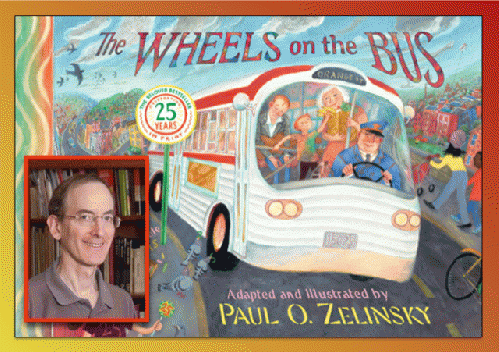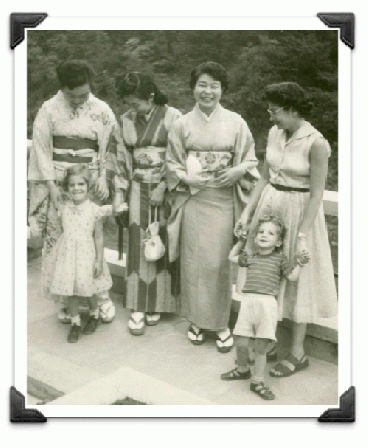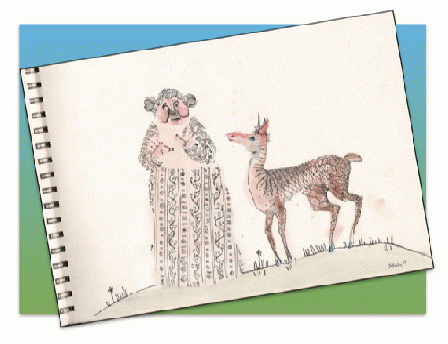
Cover art of 25th anniversary edition of 'The Wheels on the Bus'; headshot from Paul's website
(Image by courtesy of Paul O. Zelinsky) Details DMCA
My guest today is Caldecott winner and renowned children's author and illustrator, Paul O. Zelinsky.
Joan Brunwasser: Welcome to OpEdNews, Paul. You've had a long and illustrious career. In fact, one of your most beloved books, The Wheels on the Bus, celebrated its 25th anniversary in 2015 and is still going strong, with more than 3.5 million copies in print. Before we talk about that one, tell us where your interest in art and storytelling came from, please.
Paul Zelinsky: I could describe myself as a kid who at some point got interested in art and storytelling. But it feels more the case that an interest in art and storytelling decided to come into the world, and it needed a person to hang onto, so it created me.
I was born in Evanston, Illinois, a suburb of Chicago, and started drawing at an early age. When I was two, my family (my parents and older sister) moved to Japan for a year, where I was exposed to a deeply different culture, one with stronger aesthetic values than anything you'd see in the US. That influence remained after we returned to Illinois (after a year in Princeton, New Jersey, where a younger brother entered the picture).
Our new home in Wilmette housed the Japanese furniture shipped back with us; my mother kept a lot of Japanese recipes in her cooking repertoire, and Japanese friends would stop in and visit as long as my parents lived. This is not to say that my art is very Japanese, but maybe it is!
And storytelling? The art I was interested in was always telling stories. It's still the case. There is no getting around it, really; everything you can hold in your mind has a story somewhere inside.
JB: You say that "art and storytelling needed a person to hang onto, so it created me." I'm intrigued by that statement. Can you flesh that out for us? When and how did you start to feel as if you were the medium for art and storytelling rather than the other way around? Or is it the same thing, in the end?
PZ: For the most part, I'm extremely literal-minded and don't go in for mystical or even metaphorical ideas, but I made a little exception here. I really meant that I was compulsive about making pictures that told stories from a very early age-- longer ago than I can remember (I wrote stories, too), and I have no sense of this tendency as having come from anywhere. I don't descend from a family of storytellers, though I had relatives who were good at it; but I can say for sure that I either inherited or picked up a lot of drawing facility from my mother, who trained as a medical illustrator and had a better eye for likenesses than I ever will. She was also very good at writing doggerel, and could rhyme better than 99.9% of people. My father was a mathematics professor (the year in Kyoto was for his Fulbright fellowship.) He used to say that math, as practiced by research mathematicians, is fundamentally an esthetic venture; that it is about shapes of abstract things fitting together, forming patterns that are real, and waiting to be discovered.
So much for my interests and abilities not coming from anywhere....
JB: Where did your desire to tell stories, or illustrate them, for kids come from?
PZ: I guess it's a combination of an inborn desire to make things, and a conviction that illustrated books are an irrefutably desirable thing in the world. At the time I conceived this conviction I think it was even more, let's say, apart from mainstream thinking than it has since become (in the 1960s celebrities were about as interested in writing children's books as they would have been in coming out of the closet [or some other comparison I can't think of]), although I believe that most adults today still don't hold the field of children's books in particularly high regard. And I think those adults (at least the imaginary ones I'm postulating) are nuts.
I did not grow up with the intention of becoming a children's book maker. I loved books, and pictures, and pictures in books, which basically means children's books, but I didn't quite understand that books were made by living people, and that becoming one of those people was a possible thing. So I thought I'd be an artist, or an architect, or something, but I also liked to please and amuse myself and my friends by making books with stories in them. It was just something I did.
JB: You imply that children's book authors get less respect than authors of other books. How sad! I say this because I have a young granddaughter and one of my biggest pleasures is sharing new books with her as well as the ones that I read to her mom and her siblings. The old ones left such a vivid impression and are tied to so many happy family memories; they are truly unforgettable. And how many books for adults can you say that about?
Next Page 1 | 2 | 3 | 4 | 5 | 6
(Note: You can view every article as one long page if you sign up as an Advocate Member, or higher).







